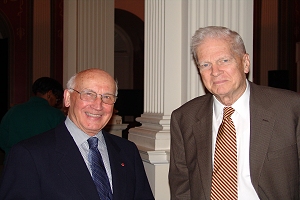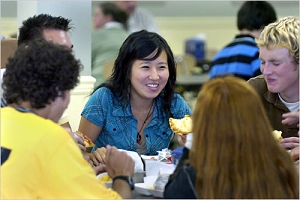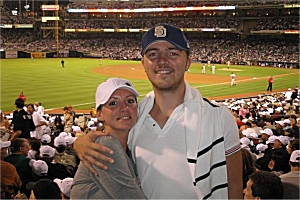Vice Versa
Herman Van der Wee says globalization occurs in waves

One of the world's foremost economic historians, Herman Van der Wee of Belgium, says that globalization is a new word for an old process that has been going on for centuries.
In a lecture, "Economic Globalization in the Mirror of History," at the Library of Congress in Washington January 17, Van der Wee said globalization in Europe began during the civilizations of ancient Greece and Rome and culminated in the market integration of the Mediterranean basin and northwestern Europe. That wave of globalization ended with the Germanic invasions of the Roman Empire, he said. He did not discuss globalization in different regions as a result of the Arab conquests. He adhered strictly to the topic of European globalization.
The next wave of globalization in Europe arose from the 11th century to the middle of the 14th century, when the owners of the large manors led a commercial revolution that increased the productivity of agriculture and created surpluses that benefited both peasants and the gentry. During the same time, religious reforms led to the organization of rural areas into parishes, which led to greater efficiency in agricultural production and to the development of social instruments to lessen conflict. During that period, the landowners acquired political, military and judicial control. Both the land owners and the peasants benefited from the surpluses, leading to expansion of markets.
The rise of warfare, notably the 100 Years War between England and France in which Joan of Arc was the most famous warrior, had a disastrous effect on European continental trade from the middle of the 14th century to the middle of the 15th centuries, Van der Wee said. During this time, the population of Europe was decimated by the plague, and fear of the disease caused travel and trade to contract. Nevertheless, maritime commerce in European port cities, such as Venice, Italy, in the south and Bruges, Belgium, in the north, flourished, according to Van der Wee.
After the resolution of the military conflicts, globalization entered a new, more intense age of expansion until the mid-17th century, Van der Wee said. Postage stamps in Europe came into being. Transportation costs plummeted. The Portuguese were exploring the coast of West Africa for slaves and gold. The speed that information traveled increased, enhancing trade, the historian explained.
Concluding his presentation, Van der Wee said that globalization is neither new nor linear. One should not be surprised if the current wave of global market integration ends and a period of extended contraction begins. After all, he commented, mercantilism, the dominant economic philosophy from the mid-16th to the mid-17th centuries, was a reaction to globalization, in a similar sense that protectionism is a reaction against market liberalization today.
Recently on Vice Versa
U.S. Student Visas Reach Record Numbers in 2007
 In 2007, the Department of State issued a record number of student and exchange visitor visas -- more than 600,000 -- greater than 10 percent more than last year. The numbers are proof of the success of the U.S. government’s effort to reverse the drop in student and other visa applications after the terrorist attacks of September 11, 2001, U.S. Assistant Secretary of State for Consular Affairs Maura Harty told USINFO.
In 2007, the Department of State issued a record number of student and exchange visitor visas -- more than 600,000 -- greater than 10 percent more than last year. The numbers are proof of the success of the U.S. government’s effort to reverse the drop in student and other visa applications after the terrorist attacks of September 11, 2001, U.S. Assistant Secretary of State for Consular Affairs Maura Harty told USINFO.
De la Democratie en Amerique, Des Elections en Amerique...
 Roberto de Primis is a political scientist. He works in the executive office of the French Community Parliament (Brussels). He is currently intern at Chaire Raoul-Dandurand en Etudes Strategiques et Diplomatiques - UQAM (Canada)
Roberto de Primis is a political scientist. He works in the executive office of the French Community Parliament (Brussels). He is currently intern at Chaire Raoul-Dandurand en Etudes Strategiques et Diplomatiques - UQAM (Canada)
De onweerstaanbare aantrekkingskracht van San Diego
 Ken Coppieters is a Belgian scientist at The La Jolla Institute in San Diego. He will regularly report on his findings of daily life in the USA.
Ken Coppieters is a Belgian scientist at The La Jolla Institute in San Diego. He will regularly report on his findings of daily life in the USA.
Dr. Ken Coppieters is als wetenschapper verbonden aan The La Jolla Institute for Allergy and Immunology en woont samen met zijn vrouw Helena Fiers in San Diego, California.